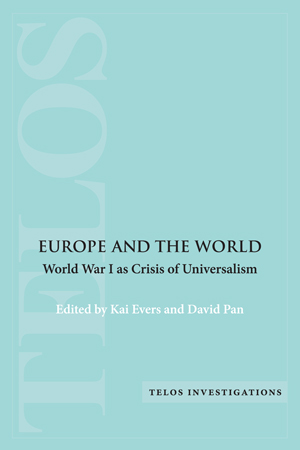New from Telos Press: Europe and the World: World War I as Crisis of Universalism, edited by Kai Evers and David Pan. Order your copy in our online store, and save 20% on the list price by using the coupon code BOOKS20 during the checkout process.
Telos Investigations is a new book series that collects papers delivered at Telos-Paul Piccone Institute conferences.
 With contributions by Étienne Balibar, Annette Becker, Russell Berman, Jörn Leonhard, among many others, Europe and the World: World War I as Crisis of Universalism focuses within Europe on the conflicts between nationalism and cosmopolitanism as a universalist political project and globally on the conflicts between European imperial politics and universal ideals. This collection of essays probes how these conflicts defined the war as the transition point to a new structure of global relations and postcolonial understandings of cultural identity. The volume’s first part considers the history of European universalism and how it affected the lead-up to the war. The second part analyzes how universalist goals affected the conduct of the war itself. While August 1914 marked a simultaneous turning point in Europe, Africa, and Asia, the war ended without such global synchronicity. Instead, it gave way to a wide variety of new spaces and chronologies of violence on a global level. Part three offers case studies of how representations of the war affected its remembrance and the way such war stories subverted or fit into different national narratives. The contributions in part four investigate different ways in which the experience of war and mass violence affected national cultures and notions of universalism in the United States and within Europe.
With contributions by Étienne Balibar, Annette Becker, Russell Berman, Jörn Leonhard, among many others, Europe and the World: World War I as Crisis of Universalism focuses within Europe on the conflicts between nationalism and cosmopolitanism as a universalist political project and globally on the conflicts between European imperial politics and universal ideals. This collection of essays probes how these conflicts defined the war as the transition point to a new structure of global relations and postcolonial understandings of cultural identity. The volume’s first part considers the history of European universalism and how it affected the lead-up to the war. The second part analyzes how universalist goals affected the conduct of the war itself. While August 1914 marked a simultaneous turning point in Europe, Africa, and Asia, the war ended without such global synchronicity. Instead, it gave way to a wide variety of new spaces and chronologies of violence on a global level. Part three offers case studies of how representations of the war affected its remembrance and the way such war stories subverted or fit into different national narratives. The contributions in part four investigate different ways in which the experience of war and mass violence affected national cultures and notions of universalism in the United States and within Europe.
Praise for Europe and the World
“This fascinating selection of essays sheds new light on the great caesura that was the First World War. For the world’s intellectuals—from Meinecke to Mann, from Barbusse to Du Bois—the events of the years 1914 to 1918 were transformative, and we learn more here about the nature of each transformation. But we also encounter less exalted transformations: the experience of the war for a West African soldier, or for a German nurse. And we also see its impact in countries, notably Iran, that historians usually overlook. Above all, the essays here remind us that the war was authentically global in its reach and unsparing in its impact on civilian populations.”
—Niall Ferguson, Milbank Family Senior Fellow of the Hoover Institution, Stanford University, and author of The Pity of War and The War of the World
“Europe and the World opens up an important interdisciplinary conversation about the centrality of World War I to the global transformations that it unleashed and that have created the outlines of our world. Taken together, these essays illuminate how the war served as a pivotal moment in the history of European imperialism and in shaping the resulting violence that has haunted the twentieth and twenty-first centuries.”
—Susan Grayzel, author of Women and the First World War



